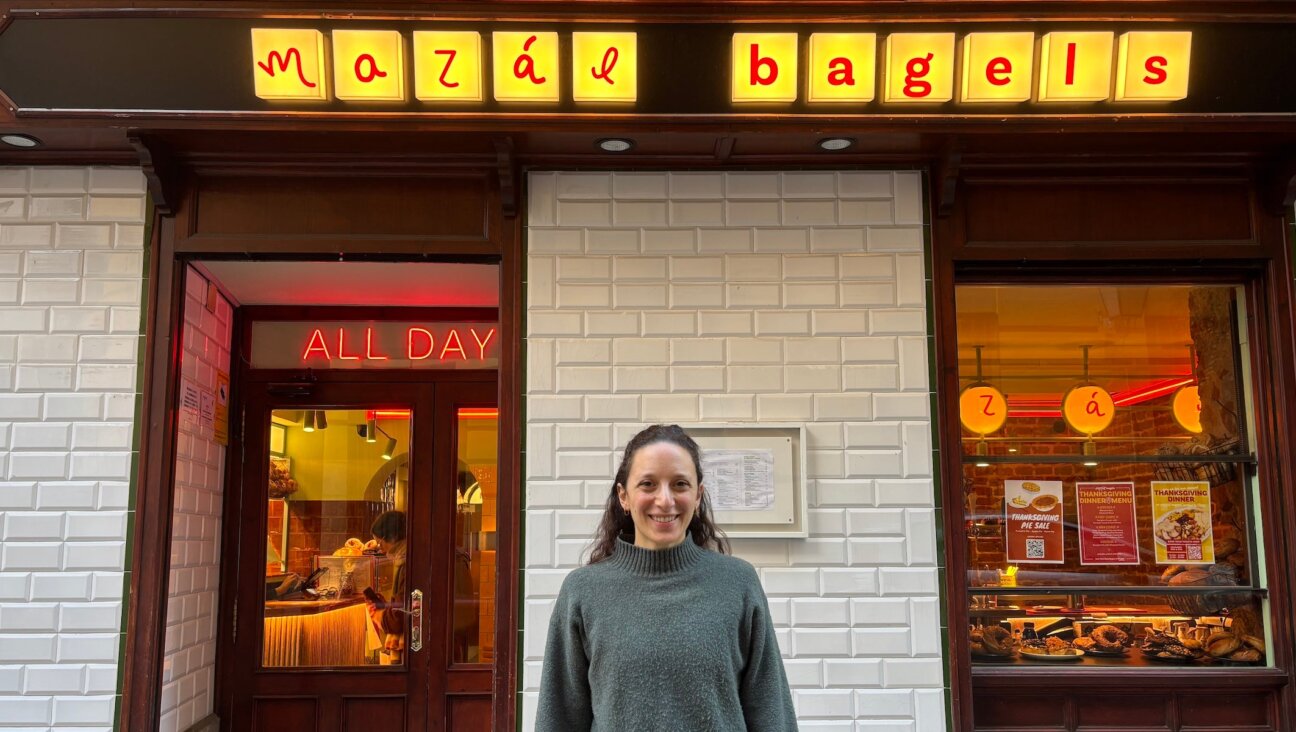These Arabs And Their Allies In High Tech Are Fighting Racial Tension In Israel

David Amir, left, and Omar Gharra. Image by Linda Gradstein
Omar Gharra carefully aims the Nerf gun at his boss, takes a deep breath, and fires. The shot scores a direct hit.
The target, David Amir, laughs and picks up his own gun. Soon, a full-fledged battle has broken out in the PA Team offices in a glass-fronted office building in the central Israeli town of Raanana.
Gharra, 26, has been at the company for just over a year. “PA” stands for “Process Automation;” the company builds software robots to handle processing jobs like uploading files or checking suitability for bank loans. Its clients include FedEx, IKEA, and Disney.
Gharra’s smarts, courage and persistence got him where he is. But he did also get some help along the way from Tsofen, a non-profit organization that aims to fight racism and increase the participation of Israeli Arab engineers in the country’s famous high-tech sector — which earned it the nickname “Start-Up Nation.” Tsofen” means code.
“My father thought it could be a problem for an Arab to go to a Jewish high-tech company,” he said, sitting in front of two large computer screens in his cubicle.
“He had heard of some experiences from some of his friends based on when they tried to work at high-tech companies in the 90s. But I really like it here.”
He is an Israeli citizen — Tsofen works only with non-Jews in Israel proper, not with anyone who lives in the West Bank. Gharra come from the village of Jatt, commuting about an hour each way to work. His father was hesitant when he applied for the software engineer job here.
The organization, which is partly funded by the Israeli government, operates in Nazareth and Kfar Qasim. It offers highly subsidized training programs to Arabs who can and want to work in Israeli high-tech companies. Since its founding in 2008, it’s helped place 2,000 Arab engineers in jobs and offered courses and training to thousands of others. Gharra, for example, took a software class at Tsofen to help him make the transition into high tech from his former job as a high-school computer science teacher.
“At Tsofen we match these Arab engineers with jobs in their fields,” Saadi said. “We prepare them for interviews, help them with CVs and give them a lot of training in technology courses.”
Gharra is a traditional Muslim who prays five times a day and fasts during Ramadan.
He usually unrolls a small prayer rug in the company’s meeting room to pray. If the meeting room is being used, he prays in the hallway. His colleagues are used to it by now. He and Amir are even friends. Yet people like him are still unusual in the world of high tech.
Arabs account for only 4% of such workers. 90% of Jewish Israelis with science or technology degrees work in their field, but only 20% of Arabs do. This, despite the fact that there is a tremendous shortage of qualified engineers in Israel.
The reasons are complex, says Sami Saadi, a Tsofen co-founder and co-CEO.
There is little day-to-day interaction between Arab and Jewish citizens in Israel. Out of ignorance, fear and hatred can grow.
Studies show that a growing number of Israeli Jews do not want to live next door to Arabs, study in the same classes with them, or work together.
Even in the absence of actual antipathy, the structure of Israeli society doesn’t facilitate integration between Arabs and Jews in the workforce.
Most Israeli men are drafted at 18 for at least three years. In the army, they make lifelong friendships, and years later often turn first to these friends when starting a company. In addition, any company that deals with security or has a government contract, hires only army graduates who can pass a security clearance.
Tsofen believes that in the long term they will be able to work around the security issue, as only a relatively small percentage of companies do that kind of work.
The goal: 20% Arab participation in the high-tech sector, which is their percentage of the population. Progress has been made. When Tsofen was founded a little over a decade ago, there were fewer than 350 Arab employees in the field. Now there are 4,500, out of a total of 120,000.
CEO Amir said that he had some initial doubts about hiring Amir and another Arab colleague who has since left the company.
“I did have some questions about how he would fit in to the company and how everyone would get along,” he said. “But I don’t really care about someone’s origin. I care if he can do the job.”
Cultural complications have arisen on both sides, and been resolved.
During the month of Ramadan, when he is fasting, Amir allows Gharra to work half-days in the office, completing his tasks from home after he has broken his fast at sunset.
Muslims and forbidden to drink alcohol, and many avoid seeing or touching alcohol. When the whole company gathers for a toast in advance of the Jewish holidays, Gharra chooses not to attend.
A more complex issue came when the company was asked to do work for a bank insurance company. Islam prohibits loaning money with interest. Amir says that Gharra came to him and asked to be excused from the project for religious reasons. The problem was that Gharra’s intended part in the project, while small, was essential.
In the end, Gharra consulted a Muslim religious authority who ruled it was permissible since it did not deal directly with taking interest.
If he had a vegan employee, Amir says, he would buy almond milk. So making accommodations for Gharra’s Muslim faith is no big deal.
Today, Gharra speaks in dozens of Arab high schools each year, trying to convince more Arab students envision a career in the Start-Up Nation’s famous high tech sector.
Saadi says he sees anti-Arab sentiments growing in Israel. Studies also show that a growing percentage of Israelis don’t like to hear Arabic.
“We believe that if people work together this racism will be reduced,” he said.
Linda Gradstein is a freelance journalist based in Jerusalem and a lecturer at New York University-Tel Aviv.
















